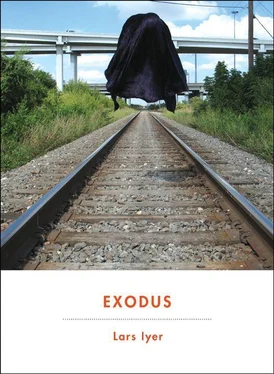But what happens when the pact is broken? W. wonders. What, when suffering is no longer, as it was for Kierkegaard, a sign of God’s love? W. reads me a quotation from Cesare Pavese’s diary:
Suffering is by no means a privilege, a sign of nobility, a reminder of God. Suffering is a fierce, bestial thing, commonplace, uncalled for, natural as air. It is intangible; no one can grasp it or fight against it; it dwells in time — is the same thing as time; if it comes in fits and starts, that is only so as to leave the sufferer more defenceless during the moments that follow, those long moments when one relives the last bout of torture and waits for the next .
He’s going to publish his essay on Cohen and Rosenzweig, W. says. His essay on the mathematical messiah. It’s time to publish! Time for the thought-harvest! Time for the doors of the great archive to open, and for his essay to be ceremonially placed in the stacks!
What will the legacy of his essay be? W. wonders. Fifty years from now, what will his essay have been? Will it have turned the world of Cohen, Rosenzweig and messianism scholarship on its head? Will it have given the world a new Cohen, a new Rosenzweig, and a new sense of messianism? Will it have transformed the scholarly field ? Will it have become an obligatory point of reference for the scholars who came after it? Will W.’s name have appeared in a million footnotes, a billion bibliographies?
Will essays for and against W.’s interpretation of Cohen, Rosenzweig and messianism have been presented at colloquia and conferences? Will special editions of journals have been dedicated to his thought on Cohen, Rosenzweig and messianism, with W. having replied in turn to his scholarly respondents?
Will doctoral students have been unable to write theses discussing Cohen, Rosenzweig and messianism without referring to W.’s Cohen, W.’s Rosenzweig and W.’s messianism? Will a sense of the paradigm-busting significance of W.’s Cohen, W.’s Rosenzweig and W.’s messianism have passed into the popular imagination, into the pages of broadsheets and TV documentaries?
Will the scholars of Oxford have whispered of W.’s Cohen, W.’s Rosenzweig and W.’s messianism as they crossed college quadrangles (‘Mathematical messianism! Of course! Why didn’t we see it — Mathematics is the key to messianism!’; ‘By Jove, what brilliance!’)? Will the governing bodies of Cambridge have wondered whether to offer W. a Chair in philosophy (‘The blighter! So he’s finally done it …’; ‘What a marvel! Dash it all, if I only had half his intelligence …’)?
Will W. have received offers of American lecture tours and plenary talks? Will fellow scholars have stood on their chairs and cried, ‘hurrah!’, throwing their mortar boards in the air when they heard him speak? Will a ticker-tape parade have been held in his hometown, with W. being driven along waving to cheering crowds?
He feels light, W. says; the burden of his essay has been lifted from his shoulders. But he has a sense of purposelessness, of casting about. What will his next project be? Where next will he direct his academic labours?
His Gottbuch , his Book of God — might it be time for that? W. wonders. His Gottesbuch — Gott is in the genitive, W. says, correcting himself. Is it really time?
Only at a certain point in your life can you begin such a project, W. says. Only once you have ripened. Is he ready yet? W. wonders. Is it time to begin?
W.’s bored of his God researches on Wikipedia. — ‘The train’s no place for serious philosphy’, he says.
A moment later. — ‘Did you know that there are many different kinds of intelligence?’, W. says. ‘Wikipedia lists at least ten’. He’s going to contribute an article of his own, he says. On the many different kinds of stupidity . After all, it’d be criminal not to share his findings with the world. Not everyone gets to observe a real live idiot at first hand.
One. Linguistic stupidity. My stammering, W. says. My stuttering. I can’t speak . And I can’t read! W. says. Haven’t I said that the sentences in the Krasznahorkai books which W. lends me are too long to follow? Didn’t I say that The Melancholy of Resistance offers too little for the reader? And that War and War is too boring ? — ‘Boring!’, W. exploded. ‘Life is boring! Literature is not a celebrity magazine!’ And then, ‘Literature should be boring!’
Two. Logical-mathematical stupidity. I’m the last person to whom he would turn for assistance in his mathematical studies, W. says. How many times has he tried to explain to me the significance of the infinitesimal in the work of Rosenzweig and Cohen? How many times has he drawn the graphs ?
Three. Bodily-kinesthetic stupidity. I’m not what he’d call a graceful man, W. says. How much have I spilt from our pint glasses, as I carry them from the bar? How many beer-trays have I dropped? It’s my great flat feet, W. knows that. Didn’t I have to wear special shoes as a child? He imagines a smaller version of me flapping along like a duck.
Four. Interpersonal stupidity. I’ve no sensitivity to other people’s moods, W. says. To his moods, for one thing! How many times have I hurt his feelings? W. says. How many times have I turned on him? It’s always the way, after the first two days of drinking: I turn . I become nasty. It’s very upsetting, W. says.
Five. Intrapersonal stupidity. This has to do with introspective and self-reflective capacities, W. says. With what Kierkegaard calls inwardness . He can imagine what I see when I look inward, W. says. There, where you’re supposed to find the soul: only the expanse of the desert and the wind blowing. There, where you’re supposed to find the centres of will and deliberation: only a surging ocean, filled with kraken. There, where you’re supposed to find the seat of the intellect: only torn clouds, racing over the moon …
Six. Naturalistic stupidity. I’ve no feeling for nature, W. says, but then nor has he. In fact, he has a Jewish suspicion of nature (‘It’s unredeemed!’), and of the cult of the natural. But animals trust him. Robins would alight on the handle of his spade as he dug in his garden, if he had a spade or a garden. Squirrels would pick nuts from his outheld palm with their tiny paws …
You can tell a lot by what animals think of you, W. says. Animals watch me warily, he’s noticed. — ‘What’s the ape man going to do?’ Even plants seem worried, twisting towards W. for help.
Seven. Moral stupidity. I speak of myself in the middle voice, he’s noticed that, W. says. In a voice that is neither active nor passive and that has neither a subject nor an object. It’s to avoid all sense of responsibility! W. says. All sense of blame! I would never say, I’ve ruined W.’s life , W. says. There was ruination in W.’s life , I’d tell him. I would never say, I’ve soiled myself. There’s been a faecal emergency , I’d tell him.
Eight. Existential stupidity. Why are we here? What’s it all for? Why is there something rather than nothing? Questions I’ve never asked myself, W. knows that. Questions he asks himself constantly! Why does Lars exist?: isn’t that his first question? W. says. Why is there Lars rather than nothing?
Nine. Sartorial stupidity. What’s behind my Our-Man-from-Havana-after-twenty-years-on-the-beer look? What’s behind my footwear ? A thinker should dress for thought, W. says. A philosopher should be judged on his tops and his tails. He’s lucky, because Sal dresses him, W. says.
Читать дальше












